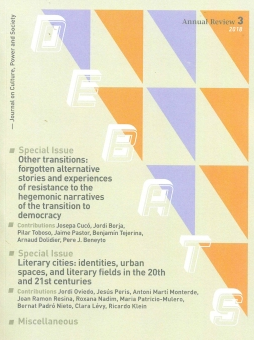Progress and the planet’s limits: some lessons for the 21st century from the debate between Godwin and Malthus
Resumen
A debate emerged at the end of the 18th century; essentially, the same one we are now discussing regarding the limits of growth. Condorcet (1793–1794) asserted that human improvement would never stop. He ruled out the possibility of the finitude of the planet becoming a barrier with arguments that, in today’s language, refer to hopes that threats are distant in the future and of ecoefficiency, dematerialisation, and postmaterialism. Condorcet invented sustainable development as a side thought! Godwin (1793) supported the idea and added that unending progress would be possible only by abolishing government, property, marriage and their associations in order to liberate the individual, thus creating a world without war, crimes, law courts and government, disease, anguish, melancholy, resentment, death, or sex. It is hardly surprising that this anarchist and individualist paradise on earth is similar to the Christian concept of heaven: the dominance of spirit over matter has been a basic belief of industrial society since its very beginning. Malthus (1798) rose against these dreams, saying that nature represents an insurmountable obstacle to their realisation, that necessity and the “imperious law of nature” restrains every organism, even humans, “within the prescribed bounds”—an idea that earned him Darwin’s praise and the enmity of many social philosophers. Malthus argued that Godwin’s vision of society, although beautiful, was unfortunately based on three errors: (1) that all social ills come from institutions; (2) that eliminating property would give rise to unending wealth; and (3) that equal sharing will always solve material shortages. Even in its literal terms, this debate anticipated a lot of today’s current discussion about sustainable development and degrowth, as well as the ecology–equity relationship.Descargas
Descargas
Publicado
Cómo citar
Número
Sección
Licencia
Sin perjuicio de lo dispuesto en el artículo 52 de la Ley 22/1987 de 11 de noviembre de Propiedad Intelectual, BOE del 17 de noviembre de 1987, y conforme al mismo, los autores o autoras ceden a título gratuito sus derechos de edición, publicación, distribución y venta sobre el artículo, para que sea publicado en Debats. Revista de cultura, poder y sociedad.
Debats. Revista de cultura, poder y sociedad se publica bajo el sistema de licencias Creative Commons según la modalidad «Reconocimiento - NoComercial (by-nc): Se permite la generación de obras derivadas siempre que no se haga un uso comercial. Tampoco se puede utilizar la obra original con finalidades comerciales».
Así, cuando el autor o autora envía su colaboración, acepta explícitamente esta cesión de derechos de edición y de publicación. Igualmente autoriza a Debats. Revista de cultura, poder y sociedad, la inclusión de su trabajo en un fascículo de la revista para que se pueda distribuir y vender.











